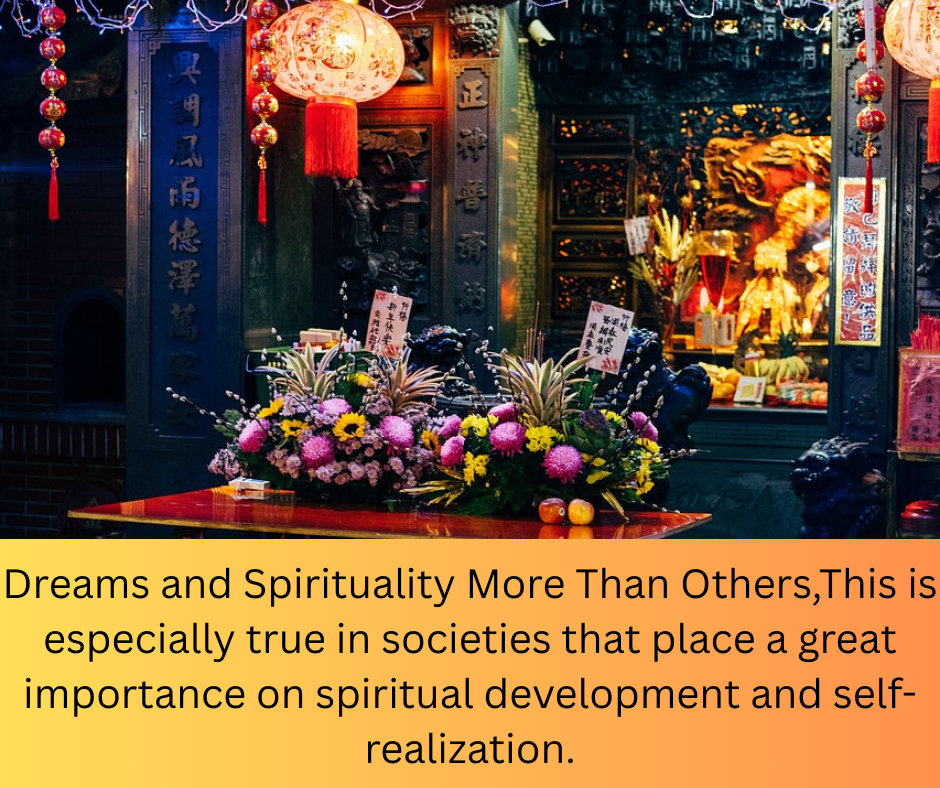Dreams and Spirituality More Than Others, Dreams, spirituality, and culture have a complicated and long-standing link that dates back to human history. The importance of dreams and spiritual activities may be highly valued in some cultures, but they may be viewed with suspicion or even ignored in others.

There are a number of reasons for this discrepancy in the importance placed on spirituality and dreams, including social structures, psychological frameworks, religious views, and historical traditions.
It is necessary to look at how dreams and spirituality have changed throughout time and how they interact with various cultural paradigms in order to comprehend why certain societies place a higher emphasis on them than others.
Table of Contents
The Historical Context of Dream Interpretation
For thousands of years, human culture has been characterized by the importance of dreams and how to interpret them. Dreams were frequently interpreted as communications from gods or ancestral spirits in ancient cultures, acting as a conduit between the spiritual and material worlds.
Dreams and Spirituality More Than Others,For instance, the ancient Egyptians believed that dreams could predict the future and offer wisdom, so they developed a complex system for interpreting dreams. Similarly, dreams were frequently regarded as heavenly messengers in Greek and Mesopotamian cultures, and dream interpretation was the subject of temples.
In contrast, the importance of dreams and spirituality has decreased in many contemporary Western countries, especially those that have been impacted by scientific rationalism and materialism. The emphasis of dream interpretation changed from supernatural revelation to comprehending latent impulses and psychological states as psychology advanced, especially with the introduction of Freudian and Jungian theories.
Dreams and spirituality, however, continue to hold significance for certain people and subcultures despite these contemporary settings, indicating that perspectives regarding these phenomena are still influenced by historical traditions and cultural norms.
Religious Beliefs and Spiritual Practices
The prevalent religious beliefs and spiritual practices of a culture are among the most important determinants of the emphasis placed on dreams and spirituality within that culture. For instance, dreams and visions are considered sacred and essential to one’s spiritual existence in many indigenous societies.
Dreams and Spirituality More Than Others,Dreams are frequently interpreted as messages from the spirit world or ancestors that help people navigate their lives by Native American tribes like the Lakota. For instance, dream catchers are said to weed out bad dreams while promoting spiritually uplifting slumber.
In a similar vein, dreams are seen as an essential channel of connection with the divine and ancestors in African traditions, such as those of the Yoruba people in West Africa. Dream interpretation is a highly esteemed ability in many African societies, and it is frequently possessed by shamans or spiritual leaders who act as bridges between the spiritual and material worlds.
On the other hand, the significance of dreams in everyday spiritual practices is typically downplayed in Western religions such as Christianity, Judaism, and Islam. Despite references to dreams as a channel of divine communication in biblical and Quranic texts—such as the biblical account of Joseph’s dream interpretation—the emphasis of both religious traditions is typically more on prayer, scripture, and ceremonial worship than on dreams as a source of spiritual understanding.
Nonetheless, there are still mystical subsets of these religions that place a high importance on spirituality and dreams. Kabbalists in Judaism, Sufis in Islam, and Christian mystics have all recognized the possibility of spiritual revelations through dreams. Dreams and Spirituality More Than Others,However, these customs are frequently seen as incidental to the core religious activities of these religions, which are centered primarily on text, group worship, and moral behavior.
The Role of Social Structures
Institutions and social systems also impact cultural perspectives on spirituality and dreams. Dreams may be more highly regarded as a source of divine instruction in cultures with strong hierarchical structures, where spiritual leaders or elders are crucial in dream interpretation. Dreams and Spirituality More Than Others,Dreams may be interpreted as messages for the community at large as well as for individuals in these societies.
For instance, in many traditional societies, dreams are seen as insights that could impact the group’s well-being and influence choices about migration, planting, and hunting, rather than merely being personal experiences.
In contrast, personal liberty and self-expression are frequently valued in more individualistic communities, such those seen in most of the Western world. Dreams may not be interpreted as divine messages in certain situations, but rather as psychological occurrences or individual experiences.
Instead of looking for heavenly guidance, dream analysis in these societies may concentrate on revealing suppressed desires or comprehending unconscious thought patterns.
The Psychological Perspective
From a psychological perspective, both individual and collective psychology can be used to understand the significance of dreams and spirituality. Renowned psychologist Carl Jung maintained that dreams are an essential tool for gaining access to the unconscious and bringing the different facets of the psyche together.
Many spiritual and psychological traditions have been impacted by Jung’s theories, which emphasize the symbolic and archetypal elements of dreams. Dreams and Spirituality More Than Others,This is especially true in societies that place a great importance on spiritual development and self-realization.
The Viewpoint of Psychology Dreams are frequently viewed as avenues to deeper self-awareness and inner peace in societies that place a high value on psychological growth and self-actualization, such as those inspired by Jungian psychology or specific types of New Age spirituality.
With dreams acting as a vehicle for personal development, these societies might place a high importance on spirituality as a way to achieve a harmonic balance between the conscious and unconscious minds.
However, the importance of dreams may be diminished to their biological or neurological purposes in more materialistic or rationalistic civilizations where psychological or spiritual endeavors are frequently confined to the domain of individual interest rather than shared value. Dreams, for instance, can be dismissed as merely the result of brain activity while you sleep and have little to no spiritual meaning.
The Influence of Modernization and Globalization
The pressures of industrialization and cross-cultural interaction frequently impact the importance of dreams and spirituality in today’s worldwide society. Dreams and Spirituality More Than Others,In many regions of the world, old spiritual traditions have been diluted or modified to meet modern lifestyles, while Western concepts of materialism, scientific rationalism, and individualism have spread throughout the world.

In some cultures, especially in urbanized and industrialized civilizations, this has resulted in a decline in the importance put on spirituality and dreams.
A renewed interest in spirituality and dream interpretation, however, is a result of the cross-pollination of cultural practices brought about by globalization. Eastern religions like Buddhism and Hinduism, which place a strong emphasis on meditation, dreams, and spiritual awakening, have drawn a lot of followers in Western nations.
Dreams and Spirituality More Than Others,In a similar vein, as people look for alternate forms of spirituality in a society that is changing quickly, traditional practices from South America, Africa, and other countries are being reexamined and incorporated into contemporary spiritual practices.
Conclusion
Numerous variables, such as historical customs, religious beliefs, social structures, psychological frameworks, and the pressures of industrialization and globalization, can be blamed for the disparities in the emphasis that different cultures place on dreams and spirituality. Some cultures consider dreams to be sacred messages from the spirit world or the divine, while others perceive them as psychological occurrences that should be examined for personal development.
Dreams and Spirituality More Than Others,Similar to this, spirituality may be more peripheral in some communities while playing a major part in others’ cultural identities. Recognizing these variations emphasizes the variety of human experience and the significance of cultural background in determining how dreams and spirituality are seen.